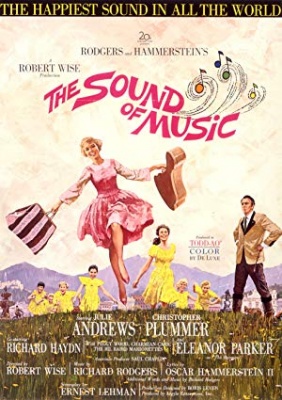Moje pesmi, moje sanje
biografski
The Sound of Music, ZDA, 172 min
Imdb ocena 8.0
Žanr: biografski, drama, družinski
Igrajo: Julie Andrews, Christopher Plummer, Eleanor Parker, Richard Haydn
Režija: Robert Wise
Avtorji: George Hurdalek (with the partial use of ideas by), Howard Lindsay (from the stage musical book by), Russel Crouse (from the stage musical book by), Ernest Lehman (scenarij)
Jezik: angleški, nemški

Slovenski opis filma:
Le malo je filmov, ki bi se tako globoko zasidrali v spomin neke generacije, kot je to uspelo najvidnejšemu muzikalu vseh časov, ki nikoli ne izgubi svoje čarobne privlačnosti. Film je zgodba o mladi redovnici Mariji, ki postane vzgojiteljica pri premožni avstrijski družini in si pridobi srca otrok in njihovega očeta. V družino prinese petje, sonce in srečo. Ker se ustraši svojih čustev, Maria zbeži nazaj v samostan, toda otroci jo pogrešajo in pridejo ponjo. Družinsko srečo skazi vojna, saj se nad Avstrijo zgrinjajo oblaki nacizma, zato prepevajoča družina sklene pobegniti iz nemuzikalne nacistične domovine.
Originalni opis filma:
In 1930's Austria, a young woman named Maria is failing miserably in her attempts to become a nun. When the Navy captain Georg Von Trapp writes to the convent asking for a governess that can handle his seven mischievous children, Maria is given the job. The Captain's wife is dead, and he is often away, and runs the household as strictly as he does the ships he sails on. The children are unhappy and resentful of the governesses that their father keeps hiring, and have managed to run each of them off one by one. When Maria arrives, she is initially met with the same hostility, but her kindness, understanding, and sense of fun soon draws them to her and brings some much-needed joy into all their lives -- including the Captain's. Eventually he and Maria find themselves falling in love, even though Georg is already engaged to a Baroness and Maria is still a postulant. The romance makes them both start questioning the decisions they have made. Their personal conflicts soon become overshadowed, however, by world events. Austria is about to come under the control of Germany, and the Captain may soon find himself drafted into the German navy and forced to fight against his own country.